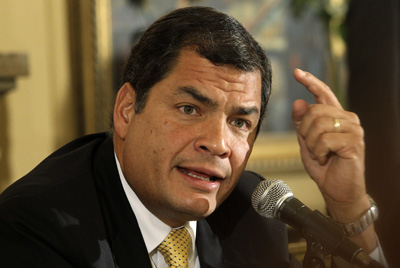New York, January 31, 2012–Reforms to Ecuador’s electoral law that will take effect on February 4 could hamper the ability of the country’s journalists to cover political campaigns and elections, the Committee to Protect Journalists said today.
The government of President Rafael Correa, who is expected to seek re-election next year, promoted the legislation, which was passed on January 10, to reform the country’s electoral law. However, press freedom groups told CPJ that the new legislation included broadly worded provisions that could result in vast censorship. Under the reforms, “almost any reporting that is published or transmitted during an electoral campaign” could be considered illegal, the Quito-based media group the Ecuadoran Journalists Forum, said in a communiqué.
“We condemn the latest reforms to Ecuador’s electoral law, which are so broad that they could, among other things, effectively prevent reporting on election matters for three months prior to the vote,” said Carlos Lauría, CPJ’s senior Americas program coordinator. “This deprives citizens of their right to stay informed on election news and represents the latest step in the deterioration of press freedom under Correa.”
One of the provisions states that the media “must abstain from promoting directly or indirectly” the campaigns of political candidates during the 90 days leading up to an election. Darwin Massuh, managing editor of the Quito daily El Comercio, told CPJ that this could mean a routine candidate profile published in a newspaper would be illegal. The journalist also said that such restrictions would benefit Correa, if he ran for another term, as well as pro-government regional and local candidates, because they could avoid scrutiny by media outlets–many of which have been critical of the Correa administration.
A second provision in the law prohibits the media from publishing or transmitting any type of information, photos, or opinions about the electoral process during the 48 hours leading up to the election. Massuh said this reform was far more draconian than electoral laws elsewhere in Latin America, where the press is often banned from publishing last-minute polling data or exit polls but is otherwise free to report on electoral activities.
Another provision prohibits private citizens, private companies, and non-governmental organizations from financing electoral advertisements or propaganda via TV, radio, print, or billboards in the 90 days before an election. According to the Quito-based press advocacy group Fundamedios, this language is so broad that it would prevent private groups from financing non-partisan activities like voter-rights campaigns.
The law’s impact will not be felt until the months leading up to next January’s presidential elections, said José Hernández, assistant editor of the Guayaquil newspaper Expreso. The journalist told CPJ that the state-run National Electoral Council would be in charge of interpreting the electoral law and levying fines on media outlets determined to be in violation of them.
Fundamedios said the law would result in censorship, which is “expressly prohibited by the Constitution,” and has filed a lawsuit before Ecuador’s Constitutional Court that claims the reforms are unconstitutional, Hernández told CPJ. Article 18, Section 1 of the Ecuadoran Constitution states that all citizens and groups have the right to “seek, receive, exchange, produce and disseminate truthful, verified, timely, contextualized and plural information, without censorship of the facts, events and processes of general interest, with subsequent liability.”
A CPJ special report published in September found that Correa’s administration has led Ecuador into a new era of widespread repression by filing defamation lawsuits in civil and criminal courts, pre-empting private news broadcasts, enacting restrictive legal measures, and smearing critics. The administration also recently spearheaded the approval of recommendations to the Organization of American States that could seriously weaken the work of the organization’s Special Rapporteur for Freedom of Expression, which has been critical of his policies.
